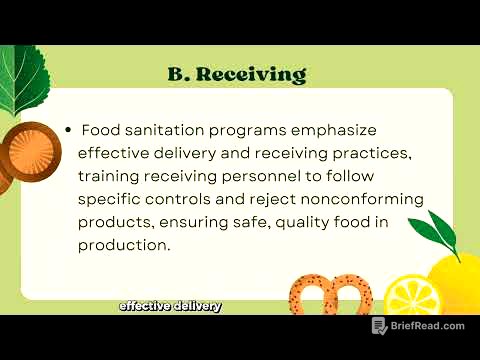Okay, I will create a detailed summary of the YouTube video based on the provided transcript, following your instructions for formatting, content focus, and style.
TLDR;
This video explores the concept of stoicism as a practical philosophy for improving daily life. It emphasizes the importance of focusing on what we can control, accepting what we cannot, and developing virtues like wisdom, courage, justice, and temperance. The video provides actionable strategies for managing emotions, dealing with adversity, and finding contentment through stoic principles.
- Focus on what you can control.
- Accept what you cannot control.
- Practice virtues: wisdom, courage, justice, and temperance.
Introduction to Stoicism [0:00]
Stoicism is presented not as an abstract theory but as a practical philosophy designed to be applied to everyday life. The core idea is to improve our existence by focusing on what we can control, such as our thoughts and actions, and accepting what we cannot, like the actions of others or external events. By aligning ourselves with virtue and reason, we can achieve tranquility and resilience in the face of life's challenges.
The Dichotomy of Control [1:01]
The central concept of stoicism is the "dichotomy of control," which distinguishes between what is within our control and what is not. We have direct control over our thoughts, opinions, desires, and actions. External factors, such as other people's behavior, the weather, or economic conditions, are beyond our direct influence. Recognizing this distinction is crucial because attempting to control the uncontrollable leads to frustration and unhappiness.
Practical Stoic Exercises [2:26]
Several practical exercises can help integrate stoic principles into daily life. One technique involves starting the day by anticipating potential challenges and mentally preparing to face them with equanimity. Another exercise is to regularly examine your judgments and reactions to events, questioning whether they align with reason and virtue. Additionally, practicing gratitude for what you have can shift your focus from what you lack to what you possess, fostering contentment.
The Four Stoic Virtues [3:52]
Stoic ethics are based on four cardinal virtues: wisdom, courage, justice, and temperance. Wisdom involves understanding the principles of nature and applying reason to make sound judgments. Courage is not merely physical bravery but also the ability to act virtuously in the face of fear or adversity. Justice encompasses fairness, integrity, and treating others with respect. Temperance is about moderation and self-control, avoiding excess in all things. These virtues are interconnected and essential for living a fulfilling life.
Dealing with Adversity [5:21]
Stoicism provides valuable tools for dealing with adversity. When faced with difficult situations, it's important to remember that our perception of events is often more impactful than the events themselves. By reframing negative thoughts and focusing on what we can learn from challenges, we can maintain our composure and resilience. Additionally, practicing acceptance of what we cannot change allows us to conserve our energy and focus on constructive action.
Finding Contentment [6:44]
Contentment, in stoic philosophy, is not about seeking pleasure or avoiding pain but about finding satisfaction in living virtuously. It involves aligning our desires with reason and accepting our circumstances with equanimity. By detaching ourselves from external outcomes and focusing on our inner character, we can cultivate a sense of peace and fulfillment that is independent of external conditions. This state of mind allows us to appreciate the present moment and find joy in simple things.









